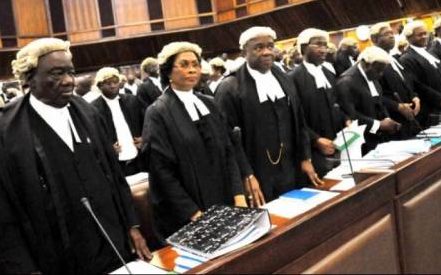The Abuja Division of the Federal High Court has dismissed a suit filed by seven lawyers against the National Judicial Council and others over the alleged unlawful appointment of judges in Kogi.
Justice James Omotosho, in a judgment, held that the plaintiffs lacked locus standi to institute the action and that the suit itself lacked merit.
The aggrieved lawyers, who hail from Kogi, are Yunus Usman, Jibrin Okutepa, Patrick Okolo, Abdullahi Haruna, Reuben Atabo, Shaibu Aruwa, and Johnson Usman.
In the originating summons, marked FHC/ABJ/CS/05/2024, the plaintiffs sued the NJC, Kogi State Judicial Service Commission (KSJSC), the governor of Kogi, the attorney general, and the commissioner for justice in Kogi as the first to fourth defendants, respectively.
They sought a mandatory order restraining the defendants from appointing new judicial officers until there was strict compliance with the laws.
In the originating summons dated January 4 but filed January 8, they sought a declaration that the selected candidates for onward transmission to NJC for appointment as judges were not “totally based on merits, competence, sound knowledge of the law, professional expertise and skill, seniority, fairness, equity and equality.”
They argued that the same was marred by political and ethnic influence contrary to the provisions of Rule 3 (6)(i)-(iv) and Rule 4(4)(a) of the NJC Guidelines and Procedural Rules for the Appointment of Judicial Officers of all Superior Courts of Records in Nigeria, 2014 and Section 153 of the 1999 Constitution (as amended).
They also alleged that the KSJS was doing the bidding of the governor. The NJC, in its counter affidavit, urged the court to strike out the suit for want of jurisdiction
The application was based on the grounds that the suit did not disclose a course of action against the NJC and that the plaintiffs lacked locus standi to file the matter.
In their counter-affidavit and preliminary objection, the second to fourth defendants prayed the court to dismiss the suit.
In a letter to the Lokoja branch of the Nigerian Bar Association (NBA), the Kogi chief judge shortlisted some judicial officers to be appointed to the state’s High Court, Sharia Court of Appeal, and Customary Court of Appeal.
The NJC had suspended the process of appointing judges and kadis to the state’s judiciary, saying the development was to maintain a fair and just judicial system following a letter by the seven senior lawyers intimating it on a suit instituted against the appointment.
Delivering the judgment on Thursday, the judge noted that though the plaintiffs brought the suit on their own behalf and the marginalised people of Okun origin and Ibaji LGA, he said, “Interestingly, none of the plaintiffs were in consideration for appointment as judicial officers.”
He added, “In fact, they are senior legal practitioners who are uninterested in becoming judges in Kogi state. In fact it has not shown that the acts of the defendants injured the interests of any of the plaintiffs in any way. They never participated in the recruitment process, neither were they appointed by the marginalised people of Okun origin and Ibaji LGA to fight their cause for them, if any.”
He said while the court was aware that the courts had expanded the realms of locus standi in some cases to include public interest litigation, there are still limits to it.
The judge, who held that the plaintiffs had no peculiar rights to protect in the suit, said it was obvious that the suit was speculative without any substance.
The judge further held that assuming without conceding that the plaintiffs had locus standi, he wondered if instituting the action was the right course of action.
The judge said that based on section 158 (1) of the 1999 Constitution, NJC cannot be subject to the direction or control of any other authority or person. According to him, the import of the above provision is that the first defendant has unfettered discretion and powers in recommending persons to be appointed as judges of the high court, Kadis of the Sharia Court of Appeal, and judges of the Customary Court of Appeal.
(NAN)





